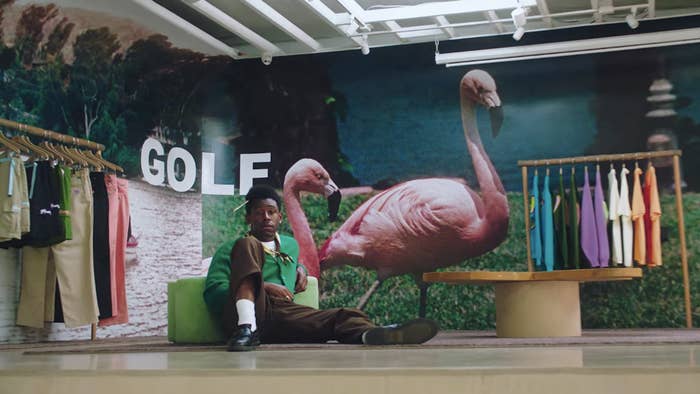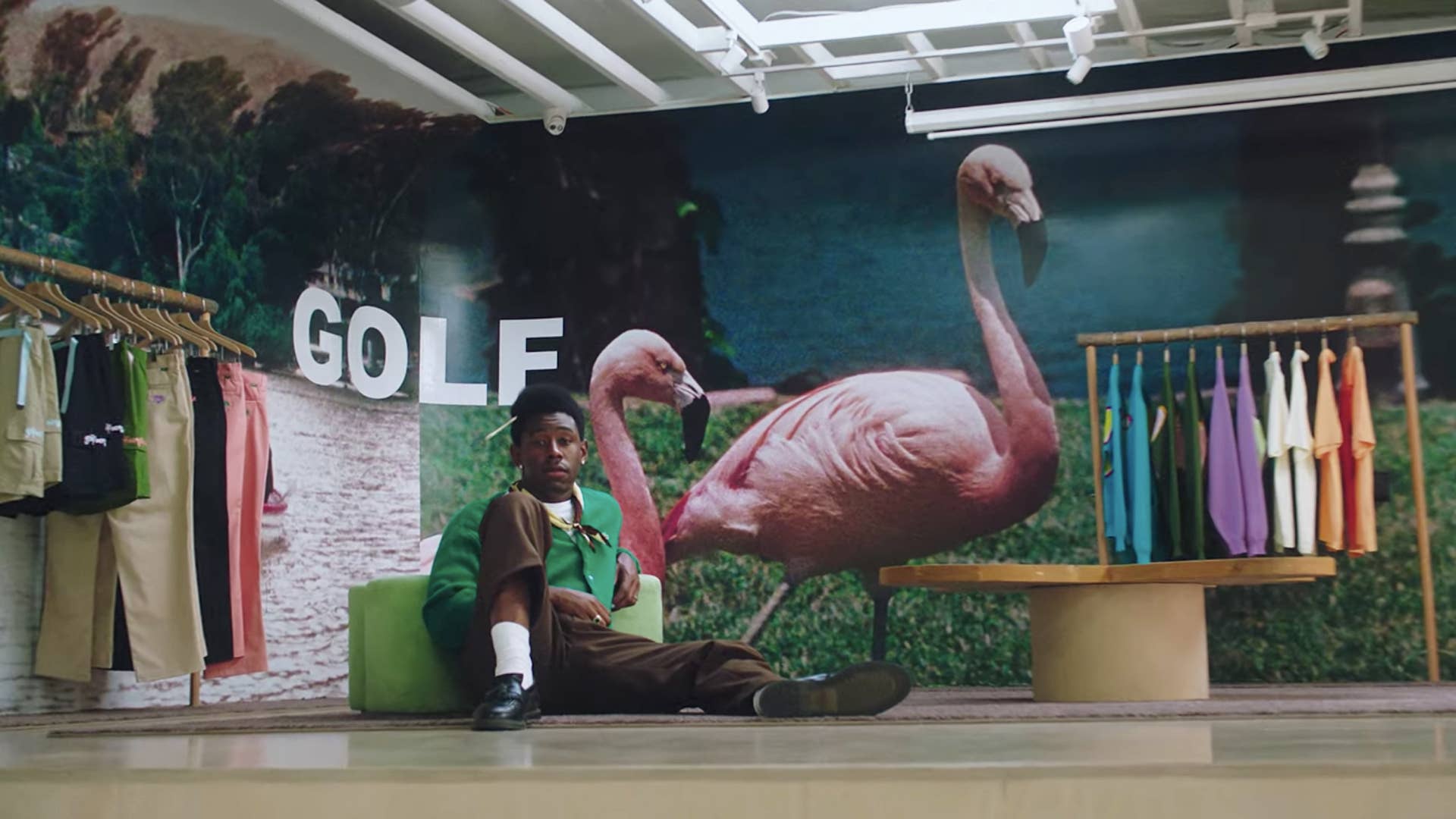
Charles Kidd, more popularly known as Calmatic, is the mastermind behind some of hip-hop’s most captivating music videos over the last few years. His resume includes Anderson Paak’s “Bubblin,” Vince Staples’ The Vince Staples Show series, and Lil Nas X’s “Old Town Road,” which won a Grammy for 2020’s Best Music Video of the Year. As a self-proclaimed filmmaker, historian, and artist raised in Los Angeles, Calmatic’s west coast hip-hop influences are present in all of his work.
“Anything that I do, I'm doing it from the perspective of a hip-hop head. So, no matter if I’m directing a music video, or designing a T-shirt, I do it from the perspective of a hip-hop guy,” he says. “I want to keep the spirit alive with some of the music videos that I fell in love with when I was younger, so I take it seriously.”
The 32-year-old wasn’t always a music video director. The job somewhat fell into his lap after years of working in the music industry with hip-hop artists, and as a musician himself. By way of producing music, rapping, and doing web design and photography for friends, Calmactic eventually found himself behind a video camera, capturing every move of his longtime friends in Overdoz. Since then, he’s branched out to other artists, building a long list of high-profile collaborators that include Kendrick Lamar, the Internet, Vic Mensa, and more. Despite his impressive resume, though, Calmatic still doesn’t quite like the term director. “I just consider myself an artist and I don't know where I’m going to end up artistically, but it’ll be done with a hip-hop perspective,” he explains.
More recently, Calmatic directed Pharrell Williams and Jay-Z’s “Entrepreneur” music video. The five-minute visual showcases Black entrepreneurs from every corner of the world, in a variety of industries, from all different walks of life. From well-known figures like Issa Rae and Tyler, the Creator to the first skate shop in Leimert Park and the first Black-owned anime studio in Japan, the video sends a message that Black entrepreneurship is boundless and attainable.
We caught up with Calmatic to hear all about finally working with Pharrell, filming Tyler, his creative process and goals for the inspiring motivational project that only took two weeks to produce. This is the story behind the “Entrepreneur” music video.
Can you walk us through the story behind the “Entrepreneur” music video?
Pharrell’s team and I have been wanting to work on a project for forever, and there were a couple of things that were supposed to happen last year—or the top of this year—but the whole pandemic thing happened. So they came to me maybe a month ago and were like, “We have this uplifting song for entrepreneurs and also just Black people in general, and we want to create a visual that highlights those people.” That was the brief that they gave me. It was just like, “We want to make something nice for them.”
I took that and I kind of sat with it a bit and formulated this approach to make it a docu-style type of thing. But then, as we started to dig deeper into some of these stories, we realized that it was something a little more special than just a documentary. I remember I had a conversation with Pharrell right before we started shooting and I was just telling him my approach and everything. He was like, “Yeah, this is dope.” We were talking about how a lot of the content and a lot of the things that people are ingesting these days are shockingly traumatic—whether it be a music video with a bunch of traumatic images, or news headlines, or Twitter stories, or all this shit that's going on with social justice stuff.
It’s just like, everything is shock. You just wake up in the morning and you see something. That shit is shocking and traumatic, over and over and over and over and over again. So the goal was to make something that's shockingly positive or shockingly motivational. The formula that we built was to set things up to show how far we’ve come, and how some people were down and out, but they managed to overcome.
Was there a specific reason why Pharrell and Jay weren’t included in the visual?
It’s obviously a Jay-Z and Pharrell song, two of the biggest artists of all time. Everybody has a certain expectation, but for me, I didn't really look at this as a performance song or a performance piece. To me, this song is like a spiritual. I don't even want to say an anthem, because an anthem feels too exciting. But I think of it as a spiritual or just a meditation on overcoming and becoming. So I didn't think it was necessary to see Pharrell and Jay-Z. We've seen them a million times. It's about focusing on the people that the spiritual represents and also to show the vastness of the entrepreneurs out there in the world. Obviously, since we're in L.A., we shot a bunch of entrepreneurs in L.A., but we also shot scenes in New York, Paris, Japan, Philadelphia, Ireland… We were all over the world and I think that was the goal, to show that it's not just about people in the big cities who are around money, but about people all around the world who are people of color and have the courage to be their own boss and start their own enterprise.
“The goal was to make something that’s shockingly positive or shockingly motivational.”
What was your creative process like for the video? How’d you go about casting?
We had our producers put together a big list of Black-owned businesses around the world. With all the social justice stuff going on, there's all these lists going around of different Black florists, Black bakeries, and just a ton of Black resources. So within those lists, we tried to find the deeper stories within those companies. We have bigger names and people that represent bigger brands, like Beatrice who runs The Honey Pot, which is sold in Target. And then we have Honey’s Kettle Fried Chicken, that's a local chicken spot in L.A., but they have an amazing family story. We just searched for the people who had the most interesting story and represented a clear example of someone who went through something to get to where they are now.
How did Tyler get involved?
I’m 32, and in my generation, our big biggest influence would probably be like Jay-Z. But then I feel like the next generation, which are the kids who are approaching 30—like ages 27 to 30—their idols were Pharrell and Kanye. I think there was a time where every kid in the hood started to skateboard, started to wear Vans, started to live that “alternative lifestyle” as a trend, and started listening to alternative music. And there was Pharrell, always dropping gems. One of his songs is called “You Can Do It Too,” and Tyler has definitely said on record that when that song came out, it made him believe that he could actually do it, and he tried to do it, and he went for it. He started producing and making music. He started being himself and not worrying about what the status quo was to be a Black kid in L.A. amongst all the craziness.
Obviously, we all know who Tyler is now and we could trace that back to that exact song. So when we reached out to him, he was super down and said that “Entrepreneur” was one of his favorite songs. We showed up to his store on Fairfax. Tyler is cool. Tyler is Tyler. He’s always a good time and super down for the cause, and it was really fun filming him because he's super photogenic. He's down for anything. So we just kinda shot around for an hour or so and talked about his story and how he got to where he is now, based on his influences. It was all good.
“When we reached out to [Tyler], he was super down and said that ‘Entrepreneur’ was one of his favorite songs.”
How long did the shoot take? Did you guys send crews all over the world to get those shots?
We started shooting two weeks before the video came out. I didn't travel particularly. We shot remotely and we had a bunch of amazing cameramen and directors in those locations. I communicated through FaceTime just to make sure things were on brand and everything like that, but they did an amazing job in capturing the vision. It's funny, because we shot most of these videos in L.A. and a handful of these people in L.A. are friends of mine. I felt weird at first, like, damn, I got all my friends in this video. But I realized that's okay, because my friends are actually entrepreneurs and changing the world. I think there's a lot of people who have friends that are entrepreneurs that are changing the world, and it just shows you how many people there are out there. It's not just like a chosen few. We could have close to a million people if we wanted. I think seeing that really motivated the next generation of potential entrepreneurs to take that leap.
Issa Rae, Beatrice Dixon, Denise Woodard, and other female entrepreneurs are showcased in the video. What was the thought process behind highlighting Black women in a song that explicitly mentions Black men?
That’s a deeper issue than just what’s on camera, but from my perspective, something that is up for debate and needs to be further discussed is how we generalize every person as a man, you know what I'm saying? We say mankind and we don’t say humankind. I think for this case, I think Black people kind of agree that when we say Black man, we're talking about everybody. I'm not as articulate as I want to be on that topic, but I think it's more of like a generalized term for just anybody that's Black.
I didn’t even consider having a certain amount of Black women. I think naturally, Black women probably—I could be wrong—but it feels like Black women probably own or have more businesses than men do. I thought it was important to make sure that was present.
How have you seen the industry change in quarantine?
Before quarantine, when things were “normal,” there was almost an abundance of opportunities, whether it be music, videos, commercials, or potential films. Once that shut down, there was all this talk about what's going to happen, and how nothing is happening right now. Then every now and then, you started to hear about certain things happening, and you realized it was because people made it happen themselves. For me, I think the biggest change was to work on my developmental side. Instead of waiting for the next music video and waiting for the next script to come to my door, I needed to make it. I needed to take this time to develop all these ideas that I've had over the years and claimed that I was too busy to do. Like, let's write them down, put them together, put together a deck, and put together a bunch of inspirational images to help build on those ideas. If anything, this pandemic has shown me the power of DIY and self-development, personally and professionally.


